Table of Contents
The Railway Recruitment Board (RRB) has announced the RRB Teacher Vacancy 2025, providing an excellent opportunity for candidates aspiring to build a career in teaching. Though it’s considered a state-level exam, the RRB Teacher Exam holds the competitiveness of a national-level exam. This is because candidates who have cleared the Central Teacher Eligibility Test (CTET) and other state-level Teacher Eligibility Tests (TET) often apply for this exam, making it highly competitive.
Aiming for a score of 60+ marks is necessary because the exam’s cutoff generally goes above 60 marks. Scoring 60 or more increases your chances of qualifying and ensures that you remain competitive in the pool of applicants. In this article, we will guide you with proven strategies and tips to help you achieve your target of scoring 60+ marks in the RRB Teacher Exam 2025 and maximize your chances of success.
RRB Teacher Exam Pattern 2025
Scoring 60+ marks in RRB Teacher Exam 2025 should be the primary goal of candidates aiming to secure their position in this competitive recruitment process. To achieve this, understanding the RRB Teacher Exam Pattern 2025 is essential, as it provides a clear roadmap of the examination’s structure. Familiarity with the pattern enables candidates to focus on important sections, manage time efficiently, and align their preparation to meet the exam’s requirements.
The RRB Teacher Exam is conducted online as a Computer-Based Test (CBT). It consists of multiple-choice questions covering various subjects. The exam typically includes 100, with a total duration of 90 minutes. Each correct answer is awarded 1 mark, while 0.33 marks are deducted for each incorrect answer as part of the negative marking system. A strategic approach begins with mastering the exam format, as detailed below.
| RRB Teacher Exam Pattern 2025 |
|||||
| Aspect | Details |
||||
| Total Duration | 90 Minutes | ||||
| Duration for PwBD Candidates (with Scribe) | 120 Minutes | ||||
| Total Number of Questions | 100 | ||||
| Total subjects | Professional Ability | General Awareness | General Intelligence and Reasoning | Mathematics | General Science |
| RRB Exam Marks Distribution | 50 | 15 | 15 | 10 | 10 |
| Marks per Question | 1 mark | ||||
| Negative Marking | 1/3 mark for each wrong answer | ||||
RRB Teacher Exam Important Scoring Topics
Candidates preparing for the RRB Teacher Exam 2025 should focus on the most important scoring topics to improve their chances of success. These topics are commonly asked and easy to score with proper preparation. By studying these areas in detail and practising regularly, candidates can boost their understanding and accuracy in the exam. Focusing on these key subjects will help candidates confidently aim for 60+ Marks in RRB Teacher Exam, which is an essential target to achieve. Below is a simplified and detailed explanation of the most important scoring topics in the RRB Teacher Exam, subject-wise:
RRB Teacher Mathematics
Mathematics is an important section in the RRB Teacher Exam 2025. A strong grasp of basic concepts like numbers, ratios, and algebra can help candidates easily score high marks in this subject. Consistent practice is key to mastering mathematical problem-solving skills, enabling quick and accurate answers.
- Number Systems: Candidates must be proficient in understanding whole numbers, integers, and rational numbers. Focus on conversions and calculations to ensure quick and accurate responses.
- Ratio and Proportions: This topic requires a strong grasp of ratios and their application in real-life situations like partnerships, mixtures, and profit-sharing problems.
- Percentage: Mastering percentages is essential for solving problems related to profit and loss, discount, and data analysis questions in the exam.
- Time and Work: Questions often test the relationship between time, efficiency, and work completed. Practice with real-life scenarios to increase speed.
- Profit and Loss: This topic frequently includes questions on cost price, selling price, and calculating profit percentages, making it crucial for scoring marks.
- Geometry and Trigonometry: Candidates should understand basic concepts such as angles, triangles, and trigonometric ratios to solve complex questions accurately.
RRB Teacher General Intelligence and Reasoning
General Intelligence and Reasoning questions test your logical thinking, pattern recognition, and problem-solving skills. Mastering these topics helps you solve questions quickly and accurately, increasing your overall score in the exam.
- Coding and Decoding: Practice decoding patterns and applying logic to understand coded relationships between symbols, numbers, or letters.
- Analogies: Focus on identifying relationships between pairs of words, numbers, or figures to solve analogy-based questions effectively.
- Data Interpretation: Candidates should practice reading and analyzing charts, graphs, and tables to answer questions accurately within a limited time.
- Venn Diagrams: Questions on Venn diagrams test the candidate’s ability to classify and organize data. Practice with varied scenarios for better understanding.
- Classification: Sharpen your skills in grouping objects, numbers, or words based on common characteristics or differences to solve classification problems.
- Analytical Reasoning: This topic tests logical thinking with problems involving puzzles, assumptions, and conclusions. Focus on solving step-by-step questions accurately.
RRB Teacher General Awareness
General Awareness questions evaluate a candidate’s knowledge of current affairs, history, geography, and important events. Staying updated with national and international news ensures success in this section and contributes to scoring well in the exam.
- Current Affairs: Stay updated with recent events, government schemes, and important national and international news for the past six months.
- Indian History and Freedom Movement: Study key events and personalities of India’s freedom struggle and its impact on modern Indian history.
- Indian Polity and Constitution: Understanding the Indian Constitution’s features, fundamental rights, and duties is vital to excel in this section.
- Indian Economy: Focus on topics like economic planning, budgeting, and India’s key economic reforms to perform well in this area.
- Environmental Issues: Prepare on topics like climate change, biodiversity, and sustainable development to excel in environment-related questions.
- General Science and Technology: Learn about recent technological advancements, space exploration, and scientific innovations for comprehensive preparation.
RRB Teacher General Science
General Science questions test knowledge in subjects like Physics, Chemistry, and Biology, typically based on the 10th standard syllabus. Mastering these concepts through regular revision can significantly boost your score in this section.
- Physics (up to 10th standard CBSE syllabus): Focus on topics such as motion, forces, electricity, and energy. Understanding practical applications of these topics is also important.
- Chemistry (up to 10th standard CBSE syllabus): Study acids, bases, salts, metals, and non-metals, along with chemical equations and their applications in daily life.
- Life Sciences (up to 10th standard CBSE syllabus): Understand key topics such as human anatomy, plant systems, and ecological balance. This forms the base for scoring in life sciences.
- Environmental Chemistry: Focus on topics like pollution, greenhouse gases, and their effects. This is an emerging area in general science.
- Cell Biology: Cover basics like cell structure, organelles, and cell division to answer direct and application-based questions effectively.
Professional Ability for RRB PGT/TGT
Post-specific topics for PGT and TGT candidates focus on education philosophy, psychology, and teaching methods. Understanding these topics can help candidates answer subject-related questions and demonstrate their expertise in teaching practices.
- Education Philosophy and Psychology: Study the theories of learning, behaviourism, and the contributions of Indian and Western philosophers to education and its psychology.
- Curriculum and Instructional Methods: Understand the principles of curriculum development and innovative instructional methods like experiential learning and project-based teaching.
- Role of Education in Social Change: Focus on how education influences societal reforms, promotes democracy, and contributes to the economic development of nations.
- Value-Oriented Education: Explore how education imparts values like morality, ethics, and respect for cultural diversity, which are crucial in contemporary education.
- Child-Centred Learning: Learn about the methods and principles of involving children actively in the learning process to develop better teaching strategies.
Professional Ability for RRB Primary Teacher
For Primary Teacher positions, candidates are tested on topics related to child development, teaching theories, and creating a positive learning environment. Mastering these topics ensures that candidates can effectively manage classrooms and support student growth.
- Understanding the Learner: Prepare on concepts like growth and development, cognitive and moral learning stages, and their practical implications in teaching.
- Teaching-Learning Theories and Methods: Focus on theories such as constructivism, and behaviorism, and their applications in lesson planning and classroom activities.
- Classroom and Learning Environment: Learn about strategies to create an inclusive, participative, and conducive environment for effective teaching and learning.
- School Leadership and Management: Study the roles of teachers as mentors, vision-builders, and community leaders, along with managing school resources effectively.
- Assessment Techniques: Prepare assessment methods like formative, summative, and diagnostic tools to evaluate students’ progress and adapt teaching accordingly.
RRB Teacher Exam Preparation Strategies
To secure 60+ marks in the RRB Teacher Exam 2025, a focused and strategic approach is essential. Candidates must allocate time effectively across different sections, enhance their knowledge in key subjects, and practice regularly to build confidence. It is important to develop a personalized study plan that addresses strengths and weaknesses. Below are the essential strategies for effective preparation:
- Take Timed Mock Tests: Practice with mock tests that are similar to the actual exam. This will help you get used to the exam format, work on your speed, and identify areas where you need to improve.
- Understand the Concepts, Don’t Just Memorize: Instead of memorizing answers, focus on understanding the concepts behind them. This will make it easier to solve tricky questions, especially in subjects like Science and Math.
- Create Mind Maps: For complicated topics like Education Philosophy and Psychology, try making mind maps. This will help you organize information in a simple way, making it easier to remember and recall during the exam.
- Focus on High-Scoring Topics: Some topics carry more marks than others. Spend more time on the important ones, but don’t skip the smaller topics. Ensure you cover everything so you’re not caught off guard.
- Learn from Your Mistakes: After taking mock tests, go through the correct answers carefully. Understand why a particular answer is right and how to approach similar questions in the future.
- Join Study Groups: Connect with others preparing for the exam. Discuss questions and solutions with them. It will not only help you learn new techniques but also keep you motivated.

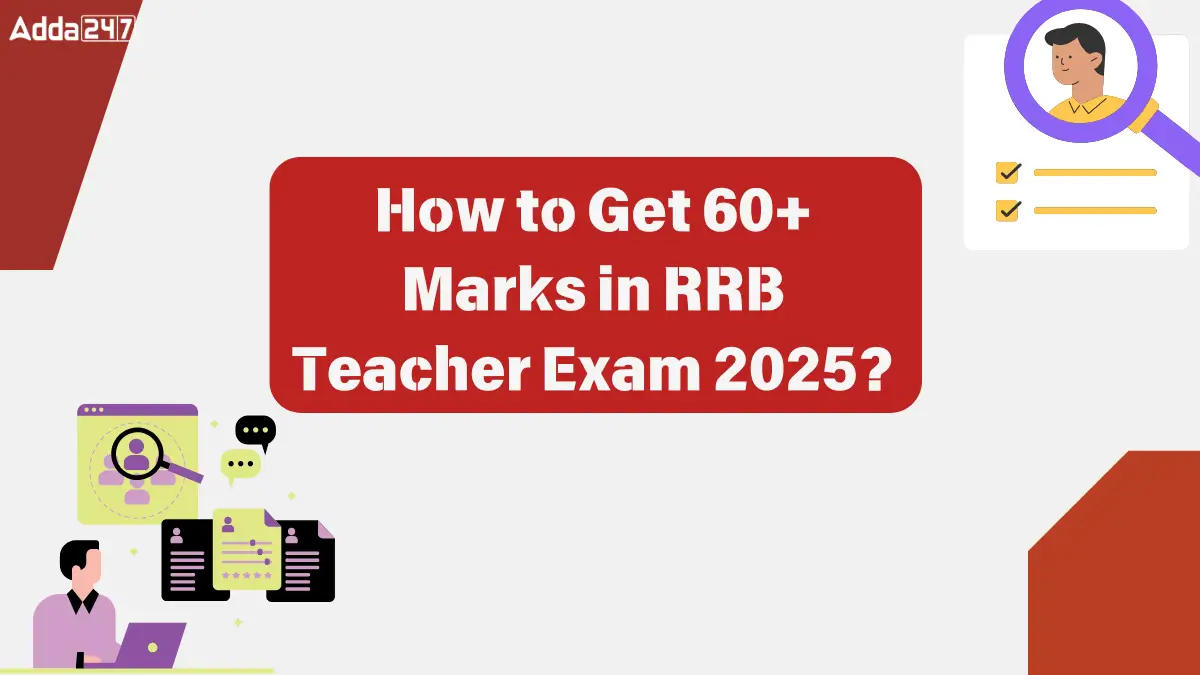
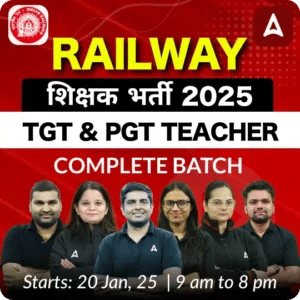

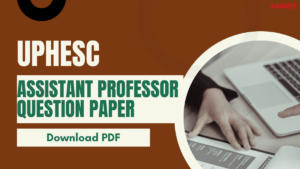 UPHESC Assistant Professor Question Pape...
UPHESC Assistant Professor Question Pape...
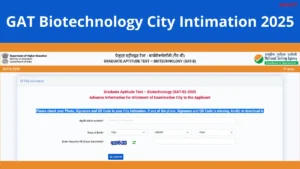 GAT Biotechnology City Intimation 2025 O...
GAT Biotechnology City Intimation 2025 O...
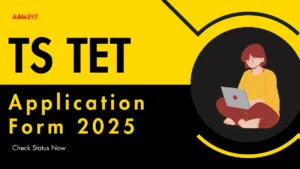 TS TET Online Application Form 2025 Out,...
TS TET Online Application Form 2025 Out,...














